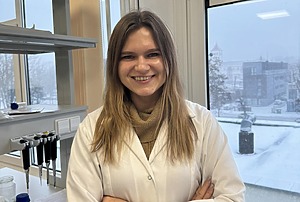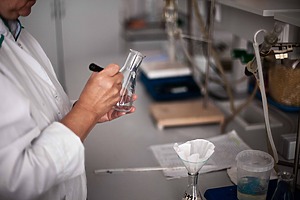Biosensors create alternative production options
Extracting phenolic acids from plants or producing them by chemical synthesis is difficult and less efficient and sustainable. Biosensors could provide alternative production options. According to Ingrida, it is an attractive production method because biosensors can detect the target compound in real time.
“Once the compound is detected, it is possible to visualise the production of phenolic acid in the micro-organism, eliminating the need to capture, isolate or otherwise process the compound produced,” she says.
In addition, the biosensors developed could also have medical applications, she says: “Some phenolic acids are found in human blood and urine as biomarkers in oncological diseases. The developed biosensors would help to make a quick and simple initial diagnosis”.
In her studies, the second-year PhD student Kutraitė is further developing her master’s thesis topic. An internship abroad she took in her first year, expanded her knowledge in the field of phenolic acid research.
“I attended a conference in Edinburgh, Scotland, where I met scientists from different European countries and learned about the research done on this topic. That’s what makes the path of a young scientist so interesting – you discover new fields, understand the everyday life of a scientist, learn from professionals and slowly become a scientist yourself,” says Ingrida.
A researcher’s job is to be creative with theoretical knowledge
A scientist’s day-to-day life brings together many disciplines – science, natural science and even humanities.
“At school, I was faced with a dilemma – I was interested in science, but I also wanted to create and write. It was only when I entered the PhD programme that I realised that it is a scientist’s daily task to be creative in his or her field of expertise,” says Kutraitė.
Ingrida notes that PhD studies are very different from first- and second-level studies, as the focus of PhD studies is research and scholarly activities. The theoretical knowledge accumulated in previous years is being applied here.
“It’s very interesting to see and realise that you are improving. You can compare what you have done in the past with what you are doing now. I would advise anyone who wants to do a PhD not to doubt themselves if they have even the slightest desire. Four years of study may seem like a lot, but it goes by faster than you realise,” smiles a KTU PhD student.
Want to pursue your scientific ambitions and create groundbreaking innovations? KTU is announcing the additional admission to certain PhD fields, including Chemical Engineering. Check out the dates and requirements here.



